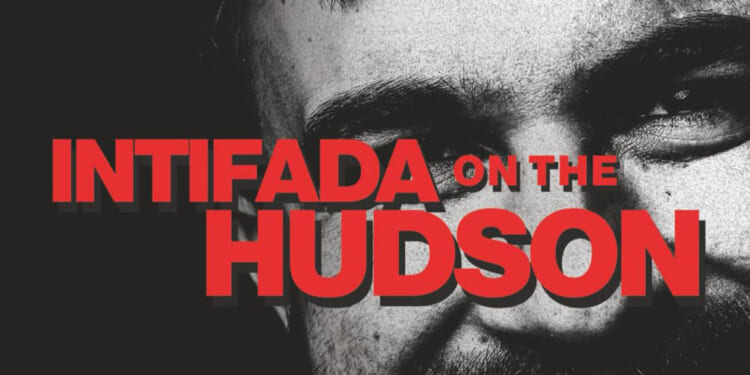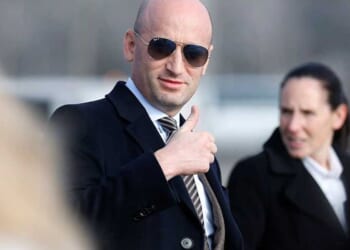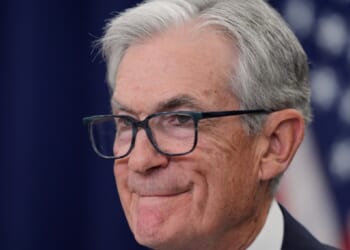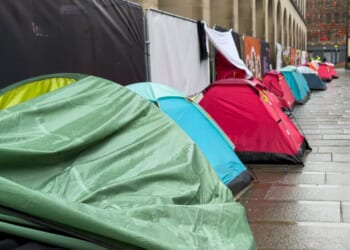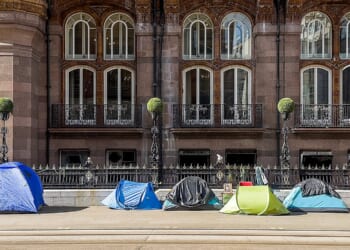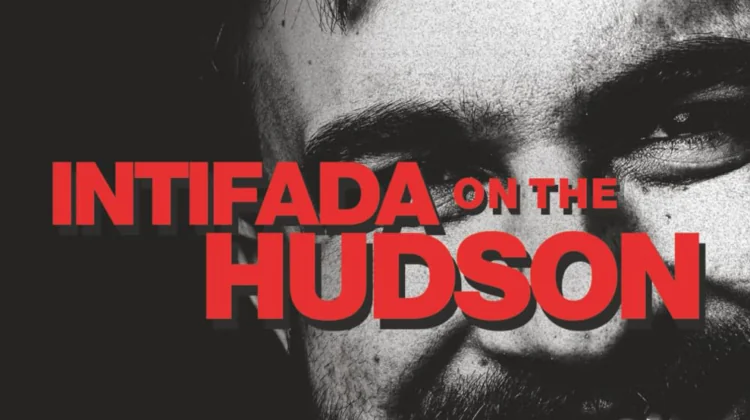
[Order Robert Spencer’s new book, ‘Intifada on the Hudson: The Selling of Zohran Mamdani’: CLICK HERE.]
I haven’t lived in my hometown, New York, for 27 years, but thanks to the Internet I’ve been able to keep in such close touch that sometimes, sitting at my computer in Norway, I catch myself thinking for a split second that I’m actually still in my last apartment on the Upper East Side, right down the block from Gracie Mansion, where the mayor lives. It’s an easy mistake to make: after all, I write regularly for Manhattan-based publications; I peruse the New York Post website daily for the latest local news and check the New York Times to keep updated on the newest twists in the left’s narrative; I exchange e-mails with New York friends; and I follow old New York acquaintances on social media mainly to monitor their Trump Derangement Syndrome.
Alas, as far as I can tell, these people’s TDS is still going strong. Nor is it just TDS that they’re afflicted with. Since October 7, 2023, many of them have been outspoken critics of Israel and have wrung their hands over the supposed suffering of the supposedly innocent people of Gaza. And in recent months, while the mayoral campaign has been heating up in advance of the November 4 election, many of them have expressed enthusiasm for the candidacy of Zohran Mamdani, who identifies as both a socialist and a Muslim. Yes, he’s made clear his distaste for Jews and his admiration for Islamic terrorists: on October 18, the Post ran a picture of him campaigning with Siraj Wahhaj, “a notorious, gay-hating Brooklyn imam who is an unindicted co-conspirator in 1993 World Trade Center bombing.” Yet a good number of the people whom I used to socialize with back in the Big Apple – many if not most of them Jewish – are likely to cast their votes for Mamdani.
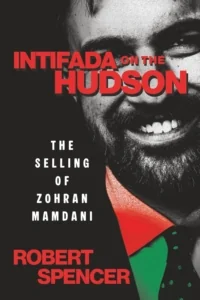
To be sure, Mamdani wouldn’t be New York’s first lousy mayor. In the late 1960s and early 1970s, John Lindsay and Abe Beame turned Fun City into the crime-ridden, garbage-strewn, dystopic nightscape that you can see in Taxi Driver (1976). Ed Koch improved things slightly, only to be succeeded by the hapless David Dinkins, whose sheer incompetence made possible the election of Rudy Giuliani despite hysterical New York Times editorials calling him a dangerous fascist. Of course, Giuliani proved to be the city’s savior, ushering in an era that older New Yorkers remember as golden. (Not to mention that his expert handling of 9/11 led Americans to refer to him as “America’s Mayor.”)
But let’s face it: Mamdani makes Lindsay, Beame, and Dinkins look like Winston Churchill. In any case, despite all the damage they did, memories are short. And they seem especially short in New York City, where old buildings are always being razed and new ones raised, and where longtime New Yorkers move away while every year brings a fresh crop of young arrivals who have no historical memory of the city, and thus no idea which policies have made it livable and which have taken it to the brink of chaos. These newcomers tend to be reflexively left-wing and mindlessly in love with New York’s diversity and even, to an extent, its palpable danger, which they find exhilarating in comparison to the dull – if safe – Midwestern cities and suburbs where they grew up; many are also recent graduates of fancy colleges where they learned to view whiteness as evil and people of color as virtuous victims, whatever the facts on the ground. Between these naive young folks, then, and the aging Manhattan liberals who still believe everything they read in the Times and who feel that voting for a socialist Muslim would be the ultimate testimony to their own nobility of soul, it appears to be likely that Zohran Mamdani will become the 111th mayor of the City of New York.
Astonishingly, even people who’ve been around a long time, who’ve paid close attention to New York politics, and whom one thinks of as old-fashioned mainstream liberals are in Mamdani’s corner. Take 76-year-old Frank Rich, a veteran New York scribe who, in a stunningly fatuous and fawning 4500-word piece in the current issue of New York Magazine, whitewashed Mamdani to a fare-thee-well, depicting him as someone who provides “rare hope” (shades of Obama!) because he’s “smart,” “focused,” “transparent,” “consistent on the core political convictions that guide him,” “not an ideologue,” an “immigrant who fell in love with his family’s adopted city and country,” and “a politician who actually wants to do the job he is running for” – in short, the perfect candidate for upscale voters who are “clamoring for change” and who deplore “the damage that Donald Trump has inflicted on the Republic.” What? What “damage”? Not an ideologue? Transparent? Consistent? Good Lord, how can someone have been around for so long and still be so clueless?
Let it be said that for anyone who’s not clueless, who cherishes American liberty, and who truly loves New York City, the idea of Mamdani as its mayor is deeply depressing. One of those people is Robert Spencer, author of the wonderfully titled and supremely timely new book Intifada on the Hudson: The Selling of Zohran Mamdani. In it, Spencer makes the case against Mamdani with a comprehensiveness that certainly must be unmatched. Spencer starts with Mamdani’s parents, both of them “postmodern leftist cosmopolitans” – Mahmood Mamdani, a “firebrand leftist academic” from Uganda who taught government at Columbia University, and Mira Nair, an Indian who developed an interest in “political street theater” before becoming “an internationally successful filmmaker.” (Until reading Spencer’s book, I was unaware that Zohran’s mother was the director of the execrable 2012 film The Reluctant Fundamentalist, which even leftist critics found “heavy-handed” and “flabby” in its relentless message-mongering.)
Because of his father’s Columbia gig, Zohran Mamdani was raised in New York. A pious Muslim in his early childhood, Zohran later lapsed; but after 9/11, the boy, now eleven years out, embraced the notion that Muslims were the real victims of that day and returned to the fold. The senior Mamdani, for his part, responded to 9/11 by writing a book, Good Muslim, Bad Muslim: America, the Cold War, and the Roots of Terror (2004), in which, claiming that jihadist violence had nothing to do with Islamic scripture, he depicted it as a legitimate reaction to U.S. imperialism and colonialism. He also defended terrorist attacks on Israel, including Hamas’s invasion of October 7, 2023. And Zohran grew up sharing his father’s opinions.
You might think that Zohran Mamdani’s parents, having thrived in the U.S., would be grateful to the system that made it possible. But no: both of them drilled it into his head that their extraordinary success was an aberration – as was the privilege with which Zohran grew up. Attending New York’s Bank Street School for Children (described by one of its graduates as a “progressive teaching laboratory”), the Bronx High School of Science (one of the best secondary schools in the country), and Bowdoin College (the alma mater of Longfellow and Hawthorne), Zohran was in fact an exceedingly entitled young man, yet he saw himself – and continues to see his younger self – as cruelly oppressed.
It was at Bowdoin that Zohran became – like father, like son – an ardently anti-Israel revolutionary. It was there, too, that he fell under the spell of The Wretched of the Earth by Frantz Fanon, whose simple lesson that whites are always oppressors and non-whites always victims has shaped the minds of college students for decades. After graduation, Zohran volunteered for the left-wing group MoveOn in Seattle, for the left-wing group TexPIRG in Houston, and for the political campaigns of a couple of New York socialists. When he finally did land a real job, the employer was his mother, who hired him to work on a movie. Then he became a lousy hiphop artist, rapping inanely about Muslims as victims of oppression and singing the praises of terrorists. His CV isn’t exactly Fiorello LaGuardia’s.
In 2020, Mamdani ran to represent a district in western Queens in the New York State Assembly, his pitch being that, as Spencer puts it, “New York, the most cosmopolitan city in the world, was…a hotbed of systemic racism” – a problem that, in Mamdani’s view, could only be addressed by a surge in government-owned housing. Declaring the need for “political revolution,” Mamdani explained that socialism “doesn’t mean stealing money from the rich” but “taking back money the rich stole from everyone else.” It worked: in the Democratic primary, he beat the incumbent by 8,410 to 7,986 votes; in the general election, he ran unopposed and won. After his victory, he spoke ambitiously of “build[ing] a socialist New York” and “seizing the means of production.”
To be sure, when he entered the mayoral race, Mamdani walked back some of his more extreme socialist views and decried opponents for bringing them up. (Andrew Cuomo, he snapped, was “far more comfortable in the past” than in the present.) In an interview, he praised ex-mayor Bill de Blasio, under whom the city had begun its latest slide into anarchy, for “end[ing] stop and frisk” and “tax[ing] the rich.” He promised to “tax people on the basis of race” and to open “city government-run grocery stores.” (To quote Spencer: “Anyone who knows what food stores are really like in socialist regimes is more than skeptical of Mamdani’s promises.”) He also said, “I don’t think that we should have billionaires” – even though he wants to run the city with the most billionaires on earth.
In Intifada on the Hudson, Robert Spencer has given us the definitive account of a man who most assuredly should not be elected to any office anywhere. If you want an idea of what a Mamdani-run city would look like, suggests Spencer, you need only get a load of London, which under the Muslim socialist Sadiq Khan (mayor since 2016) has declined to such a point that, unlike Beame- and Dinkins-era New York, it may well be beyond rescue. Under Khan, notes Spencer, “crime has skyrocketed, the native population has fled the city, and the situation of Jews…has become increasingly precarious.” Are the Jews who plan to pull the lever for Mamdani even aware of this?
“Mamdani,” observes Spencer wryly, “may ultimately have been more comfortable being mayor of East Berlin, where there was a wall around the place, and ruthless armed guards all too eager to murder anyone who tried to escape to freedom.” Fortunately, there’s no wall around New York City – only bridges and tunnels on which the traffic can, admittedly, get very heavily backed up, but that even Mamdani won’t be able to close entirely – so that New Yorkers who don’t want to go broke or get murdered can relocate before the moving trucks pull up to Gracie Mansion.
Can Intifada on the Hudson keep Mamdani from being elected mayor? Probably not. In any event, even if Mamdani does lose somehow, his political career will almost certainly survive. As Spencer points out, he is, along with Ilhan Omar, Alexandria Ocasio-Cortez, Hakeem Jeffries, and Jasmine Crockett, part of a growing cadre of young non-white socialist Democrats, many of them Muslims and many of them foreign-born, who are quickly replacing their party’s old guard at every level of U.S. government. It’s a terrifying development, and if fatuous New Yorkers are determined to hand their city over to this enemy within, non-New Yorkers should redouble their efforts to keep their own little corners of America from falling prey to the socialist Muslim menace.

